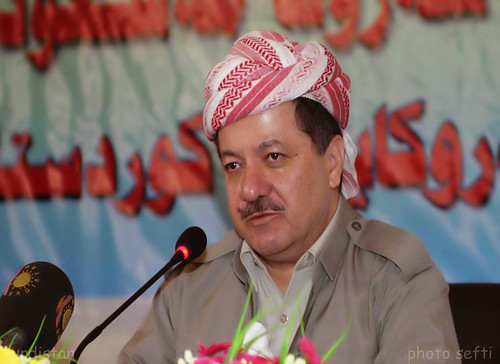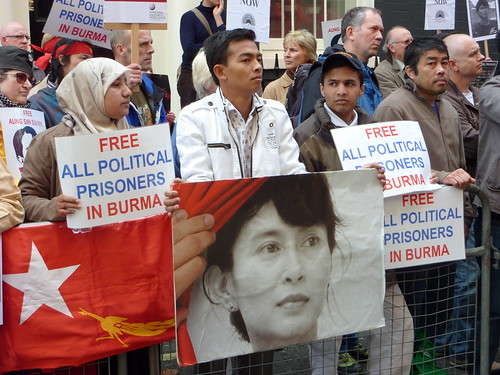 Amidst growing resentment towards the Iraqi central government, Iraqi Kurds will vote on Saturday for a president and Parliament. The semi-autonomous northern Kurdish region will elect a president for the first time (previously, the president was appointed by Parliament) in an contest central to land disputes with Baghdad. Incumbent president Masoud Barzani is expected to return to power while his Kurdistan Democratic Party (KDP) and Iraqi president Jalal Talabani’s Patriotic Union of Kurdistan (PUK) are expected to share parliamentary seats. Barzani has accused Baghdad of taking advantage of Kurdish oil resources and unfairly claiming 16 disputed areas historically populated by Kurds. Many observers expect the new government to reach an energy-sharing deal with Baghdad over use and extraction in the North, especially in the oil-rich area of Kirkuk, although Barzani has insisted that he will not compromise on Kurdish claims to that region. In June, the Kurdish government began independently exporting oil for the first time, though Baghdad has since called Kurdish oil contracts invalid and illegal.
Amidst growing resentment towards the Iraqi central government, Iraqi Kurds will vote on Saturday for a president and Parliament. The semi-autonomous northern Kurdish region will elect a president for the first time (previously, the president was appointed by Parliament) in an contest central to land disputes with Baghdad. Incumbent president Masoud Barzani is expected to return to power while his Kurdistan Democratic Party (KDP) and Iraqi president Jalal Talabani’s Patriotic Union of Kurdistan (PUK) are expected to share parliamentary seats. Barzani has accused Baghdad of taking advantage of Kurdish oil resources and unfairly claiming 16 disputed areas historically populated by Kurds. Many observers expect the new government to reach an energy-sharing deal with Baghdad over use and extraction in the North, especially in the oil-rich area of Kirkuk, although Barzani has insisted that he will not compromise on Kurdish claims to that region. In June, the Kurdish government began independently exporting oil for the first time, though Baghdad has since called Kurdish oil contracts invalid and illegal.
12 people have been killed in Southern Yemen after security forces attacked southern secessionists during a protest in the city of Zinjibar. Southern secessionist leaders have accused of the government of firing live bullets and committing “a massacre against unarmed civilians.” Yemeni officials have denied that security forces are responsible for the deaths and have instead pointed blame at armed and “outlawed” individuals in the South who they claim seek to sow havoc. While secessionist sentiment was strong during the protest, demonstrators also complained about scarce water and power outages. The deaths draw attention to growing anti-government sentiment in the South, which has been ratcheted up by former army leaders who recently have joined the secessionist movement.
Read our July 2 Big Question for more information on the Yemeni southern secessionist movement.
 The trial of Myanmar opposition leader Daw Aung San Suu Kyi will close today as defense and prosecution lawyers present their final arguments at the Insein prison in the former Burmese capital of Yangon. If found guilty of violating her house arrest by accepting an uninvited American man into her home, Aung San Suu Kyi could face five years in jail. International observers have criticized the trial and accused Myanmar’s military regime of using trumped up charges against Aung San Suu Kyi to exclude her from participating in national elections next year. The ruling junta in Myanmar has accused foreign officials and media of “interfering” with the trial, which coincidentally began two days before her house arrest was due to expire. Aung San Suu Kyi is the leader of the National League for Democracy (NLD) and has spent 13 of the past 19 years in detention since the ruling regime refused to recognize the NLD’s landslide victory in the 1990 elections.
The trial of Myanmar opposition leader Daw Aung San Suu Kyi will close today as defense and prosecution lawyers present their final arguments at the Insein prison in the former Burmese capital of Yangon. If found guilty of violating her house arrest by accepting an uninvited American man into her home, Aung San Suu Kyi could face five years in jail. International observers have criticized the trial and accused Myanmar’s military regime of using trumped up charges against Aung San Suu Kyi to exclude her from participating in national elections next year. The ruling junta in Myanmar has accused foreign officials and media of “interfering” with the trial, which coincidentally began two days before her house arrest was due to expire. Aung San Suu Kyi is the leader of the National League for Democracy (NLD) and has spent 13 of the past 19 years in detention since the ruling regime refused to recognize the NLD’s landslide victory in the 1990 elections.
Responding to recent statements made by U.S. Vice President Joe Biden assuring Georgian entry into NATO, the Russian envoy to that body has called it “impossible” and “absurd” as long as Georgia’s contested borders remain undefined. The envoy, Dmitry Rogozin, said that Georgia’s borders—leaving out South Ossetia and Abkhazia—needed to be internationally recognized before the nation could enter the Western military alliance. Rogozin added that Georgia might join NATO eventually, “if NATO still exists by that time.” Earlier this week, Biden visited Georgia with assurances that Washington fully supports Georgian NATO aspirations and a “united Georgia,” which includes South Ossetia and Abkhazia. Russia and Nicaragua are the only nations that currently recognize the breakaway republics of South Ossetia and Abkhazia as independent states. Last summer, Russia and Georgia fought a war over control of the region. Since the conflict, Russia has restricted its military cooperation with nations that provide weapons to Georgia. Rogozin has warned that Georgia’s “ongoing militarization” is dangerous and could lead to deteriorating Russian military and diplomatic ties with the West.